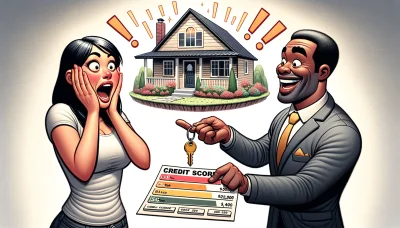Understanding closing costs Quiz
Test Your Knowledge
Question of
What Are Closing Costs?
Definition and Overview
Closing costs are the expenses, over and above the property price, that buyers and sellers usually incur to complete a real estate transaction. These costs can vary widely based on location, property type, and the specifics of the deal. They're a crucial part of the process, often amounting to 2-5% of the purchase price!
The Role of Closing Costs in Real Estate Transactions cannot be overstated. They cover a range of services necessary for transferring property ownership, such as title searches, attorney fees, and appraisal costs. It's vital to understand these costs to budget effectively for your home purchase or sale!
There are some Common Misconceptions About Closing Costs , like the idea that they're a hidden fee or an optional part of buying a home. Not true! They're standard practice essential for ensuring all legalities are handled correctly and both parties are protected.
Types of Closing Costs
Closing costs come in various forms, each with its own significance. You'll encounter Recurring vs. Non-Recurring Fees . Recurring fees include ongoing costs like property taxes and homeowners insurance, while non-recurring fees are one-time charges such as appraisal fees or title insurance.
It's also important to distinguish between Mandatory vs. Optional Charges . Mandatory charges are those required by lenders or law; optional charges may include rate lock-in fees or a home warranty these you can negotiate!
- Title Insurance
- Loan Origination Fees
- Appraisal Fees
- Prepaid Interest
- Escrow Deposits
Who Pays What?
The question of who foots the bill for what can be complex. Generally speaking, the Buyer's Responsibilities include most closing costs since they're obtaining the loan. However, buyers can sometimes negotiate with sellers to cover some expenses it's all about striking a deal!
Seller's Contributions can significantly affect the final settlement statement. Sellers typically pay agent commissions and may agree to pay certain buyer closing costs to sweeten the deal or expedite the sale. Understanding this dynamic is key to a successful real estate transaction!
In conclusion, whether you're buying or selling, get familiar with closing costs! They're an inevitable part of real estate transactions but manageable with knowledge and negotiation skills.
Calculating Your Closing Costs
Understanding the Good Faith Estimate
When you're navigating the thrilling world of real estate, getting a handle on closing costs is like finding a treasure map that leads to a smoother transaction. The Good Faith Estimate (GFE) is your golden ticket, providing a preview of your closing costs before you reach the finish line of home buying. Lenders are required by law to furnish this document within three days of your loan application, so keep your eyes peeled for it!
The GFE outlines estimated charges you're likely to incur, making it a crucial tool in budgeting for your home purchase. It's not just about numbers; it's about empowerment! By understanding your GFE, you can stride confidently towards closing with fewer surprises and more control over your financial commitments.
Remember, knowledge is power! The GFE isn't set in stoneit's an estimateso actual costs may vary. But having this information at your fingertips puts you in the driver's seat as you navigate through the home-buying process.
The Importance of the Loan Estimate Form
Drum roll, please! Enter the Loan Estimate Formanother heavyweight champion in the world of real estate documentation. This form goes hand-in-hand with your GFE and provides a detailed breakdown of your loan terms, interest rates, and closing costs. It's not just important; it's essential for understanding the full scope of what you're signing up for!
With this form in hand, you can compare offers from different lenders like a pro. Its designed to be user-friendly, so don't shy away from scrutinizing every detail. This is where clarity meets opportunityyou'll have all the info needed to make an informed decision that aligns with your financial goals.
How to Read and Interpret the GFE
Now lets dive into decoding the GFE! It might seem daunting at first glance, but fear not! Each section is a piece of the puzzle that forms a complete picture of your closing costs. From loan origination fees to title insurance, each line item is an ingredient in the recipe for successful homeownership.
To truly master the art of interpretation, cross-reference these figures with other estimates and ask questions if something doesn't add up. Your lender should be ready to clarify any confusionafter all, it's their job to guide you through this process with transparency and expertise!
Typical Closing Cost Percentages
Lets talk numbers! Typical closing cost percentages are like signposts guiding you through the terrain of real estate transactions. Generally speaking, expect closing costs to range between 2% and 5% of your home purchase price. That might seem small at first glance, but these percentages can translate into significant sums that you need to be prepared for!
Average Cost Ranges by Home Price
Heres where things get interesting: average cost ranges by home price can vary widely. Purchasing a $200,000 home? You might see closing costs from $4,000 to $10,000. Eyeing a $500,000 property? That could mean $10,000 to $25,000 in closing expenses. These figures aren't just hypotheticalsthey're real numbers that impact real budgets!
Regional Variations in Closing Costs
- New York: Brace yourself for some of the highest closing costs nationwidea result of complex regulations and high transfer taxes.
- Texas: Everythings bigger in Texasincluding closing costs! They stand out due to hefty title insurance fees and taxes.
- California: Expect variations across counties but prepare for generally high costs given the Golden States robust real estate market.
Unexpected Fees to Watch Out For
Bewarethe road to homeownership can have hidden traps! Unexpected fees are like plot twists in your real estate story; they can pop up when least expected. Stay vigilant and keep an eye out for charges that weren't on your original GFE or Loan Estimate Form.
Last-Minute Charges and How to Question Them
Last-minute charges can throw a wrench in your budget if you're not careful. If new fees emerge as you approach closing day, dont hesitatequestion them immediately! Ask for justification and dont back down until you get clear answers. Its not just about being cautious; its about protecting your investment!
Negotiating Down the Costs
Negotiating down costs isn't just savvy; it's smart finance! Some fees on that settlement statement are negotiable or even waivable if you play your cards right. Dont be shyengage in discussions with your lender or agent about reducing or eliminating certain charges. Remember: every dollar saved is a dollar earned toward starting life in your new home on stronger financial footing.
Timing and Payment of Closing Costs
When Are Closing Costs Due?
Get ready, homebuyers! The moment of truth in your home-buying journey culminates on the closing day. That's when all closing costs are due! This is a pivotal event, and you need to be prepared. Typically, closing costs are paid at the time of signing the final loan documents. It's a one-time payment that unlocks the door to your new home!
Remember , these costs cover the services rendered throughout the real estate transaction. They include title insurance, appraisal fees, credit report charges, and more. You'll receive a Closing Disclosure form detailing these expenses at least three days before your scheduled closing date. Review it carefully!
Don't underestimate the importance of this financial rendezvous! It's essential to have your funds ready for this significant exchange. Be proactive and ask your lender for an estimated closing cost statement well in advance so there are no surprises.
The Closing Day Breakdown
Closing day is like the grand finale of your real estate transaction! It's thrilling and filled with anticipation. On this day, you'll be signing a stack of documents and watching as various fees get paid out to complete the sale. These include notary fees, attorney fees, and government recording charges.
The spotlight is on you during this financial symphony! All eyes will be on how smoothly you handle these transactions. It's a test of your preparation and understanding of the process. Each fee has its purpose in sealing the deal on your property purchase.
Be alert and attentive! This isn't just another meeting; it's a milestone event where ownership is transferred to you. Ensure you understand each fee and service you're paying forthis is not just about handing over money; it's about securing your investment.
Preparing Your Finances for Settlement Day
- Budget Wisely: Account for every penny that will be needed on settlement day. This includes closing costs and any additional funds required by the lender.
- Gather Your Funds: Ensure all necessary funds are in an accessible account several days before closing to avoid last-minute hiccups.
- Final Walkthrough: Conduct this crucial step to confirm that the property condition meets agreed-upon terms before releasing your funds.
This isn't just about dotting i's and crossing t's; it's about safeguarding your future home. You've come too far to stumble at the finish lineprepare meticulously!
Your financial readiness is key! Approach settlement day with confidence by having all ducks in a rowyour wallet will thank you later!
Methods of Payment
Acceptable Forms of Payment at Closing
No personal checks allowed herethis is big-league finance! We're talking cashiers checks or wire transfers as acceptable forms of payment at closing. Make sure these transactions are secure and verified ahead of time to ensure a smooth transition.
The stakes are high, so precision is critical! Double-check amounts, account numbers, and routing details when arranging wire transfers. Any errors could delay your closing or put funds at riska scenario we want to avoid at all costs!
Escrow Accounts and How They Work
An escrow account acts as a neutral third party holding onto funds until all conditions are met for the transaction to close. This ensures that both buyer and seller uphold their end of the bargain before any money changes hands.
This isn't just any accountit's a security measure that protects all parties involved in the real estate transaction! Lenders often require an escrow account to hold future property tax payments and homeowners insurance premiums.
Prepaid Items vs. Closing Costs
Understanding Prorations and Prepayments
Dive into the nitty-gritty details here: prorations refer to dividing ongoing expenses like property taxes or HOA fees between seller and buyer based on who owns the property during which part of the year.
Note: Prepayments aren't just another feethey're prepaying for services you will use as a homeowner, such as interest or insurance!
The Impact on Your Initial Outlay
Your initial outlay isn't just about covering closing costsit also includes prepaid items which can add up quickly! Think homeowners insurance premiums or months worth of property taxes tucked into an escrow account.
This isn't money disappearing into thin airit's ensuring that you're covered from day one in your new home!
Reducing Your Closing Costs
Shopping for Service Providers
Get ready to dive into the world of savvy savings because when it comes to real estate, every penny counts! Shopping for service providers is a golden opportunity to slash those closing costs. Don't just settle for the first option that comes your way; explore and compare! Lender fees, title insurance, escrow services they can all vary in price. It's a competitive market out there, and you have the power to choose. Seek out quotes, scrutinize them like a detective, and watch the savings pile up!
But wait, there's more! The benefits of shopping around for insurers and surveyors are immense. Imagine cutting down expenses on homeowner's insurance or finding a surveyor who offers top-notch service without breaking the bank. These are not just potential savings; they're investments in your financial well-being. Be proactive, ask questions, and demand clarity on every charge it's your right as a homebuyer.
Negotiating with Sellers and Lenders
Now let's talk tactics! Negotiating with sellers can feel like a chess game, but when you know the moves, you can win big. Seller concessions are not just a possibility; they're a leverage point for you. Whether it's asking the seller to cover some of the closing costs or negotiating repairs, these concessions can significantly reduce your out-of-pocket expenses. Be bold, be strategic, and remember if you don't ask, you don't get!
And when it comes to lenders, don't hesitate to approach them for discounts or waivers. Yes, lenders have standard fees, but guess what? There's often room for negotiation. From application fees to processing charges, make your case for why you deserve a discount. Your lender wants your business use that to your advantage! How to Approach Lenders for Discounts or Waivers is not just advice; it's an action plan for better financial outcomes.
Credits and Rebates to Consider
Lender credits are not mythical creatures; they're real, and they can be a game-changer! Understanding how lender credits work could mean more money in your pocket at closing. In exchange for accepting a slightly higher interest rate over the life of your loan, you could receive credits that offset some of your upfront costs. It's all about long-term thinking weigh the pros and cons carefully!
- Lender Credits: A strategic trade-off between higher interest rates and lower upfront costs.
- Government Rebates: Don't overlook potential tax incentives and rebates designed specifically for homebuyers.
- Incentives for Energy Efficiency: Some programs offer rebates for homes meeting certain energy efficiency criteria.
Last but certainly not least are government rebates and incentives for homebuyers. Are you aware that certain home purchases might qualify for financial boosts from government programs? We're talking about tax incentives, rebates for energy-efficient homes these are opportunities begging to be grabbed! Do your research or consult with a professional because these incentives can make a substantial difference in reducing your closing costs.
Long-Term Considerations of Closing Costs
The Impact on Your Mortgage Terms
Understanding closing costs is pivotal in real estate transactions! They're not just upfront fees; they influence your mortgage terms significantly. When you're calculating the cost of purchasing a home, it's not just about the listing price. Closing costs can add up to a substantial amount and directly impact your loan balance. This means higher monthly payments and more interest over the life of the loan. It's essential to grasp this to make informed financial decisions!
Now, let's talk about how these costs affect your interest rate. If you choose to roll closing costs into your loan, you're essentially borrowing more money. This increases the lender's risk, which could result in a higher interest rate. Over time, this seemingly small adjustment can translate into thousands of extra dollars paid in interest. Make no mistake the decision you make regarding closing costs has long-lasting repercussions!
The long-term financial implications are clear: rolling costs into your loan means paying more over time. But there's a flip side paying closing costs upfront preserves your loan balance but requires immediate cash outlay. You need to weigh these options carefully because they will shape your financial future for years to come!
Tax Implications of Closing Costs
Did you know that certain closing expenses can be tax-deductible? That's right! As a homeowner, you might be able to reduce your taxable income by deducting eligible closing costs. This includes items like mortgage interest points paid at closing, property taxes, and some legal fees. This is a game-changer for your annual tax bill and can save you a hefty sum over time!
But it doesn't stop there! Keeping meticulous records of your closing costs can pay off in the long run. Why? Because when it comes time to sell your home, these records can help reduce potential capital gains taxes by increasing your home's tax basis. It's crucial to understand that every document saved today could be a dollar saved tomorrow in the world of real estate!
- Save all receipts related to home purchase and improvements.
- Maintain detailed records of all property-related expenses.
- Consult with a tax professional to maximize deductions.
Refinancing and Closing Costs Revisited
Refinancing can be a strategic move to lower overall expenses, but it comes with its own set of closing costs. When considering refinancing, evaluate the break-even point that is when the monthly savings exceed the new closing costs incurred from refinancing. This critical analysis will determine if refinancing truly benefits your wallet in the long run.
Assessing new closing costs in refinancing scenarios demands attention! These costs can include application fees, appraisal fees, title searches, and more they add up quickly! Before jumping into refinancing, calculate whether these new expenses are justified by the potential savings on your mortgage payments. It's not just about lower interest rates; its about smarter financial planning!
In conclusion, whether you're buying or refinancing a home, understanding closing costs is vital for making savvy financial decisions that benefit you for years to come! Don't overlook this crucial aspect of homeownership it could mean the difference between financial strain and financial gain!












